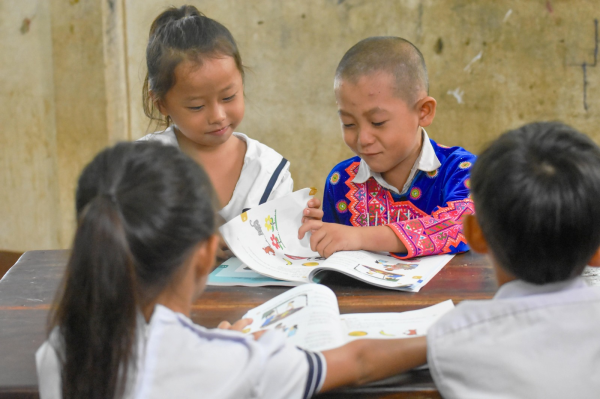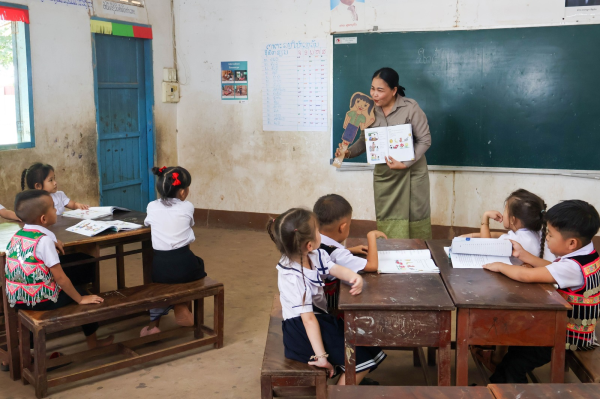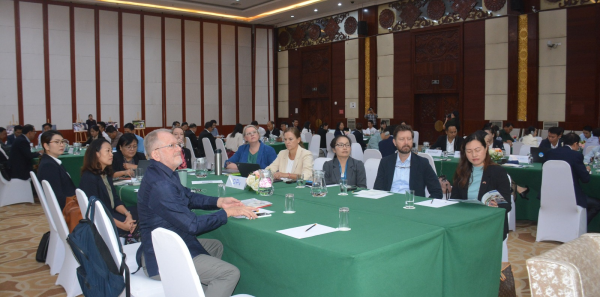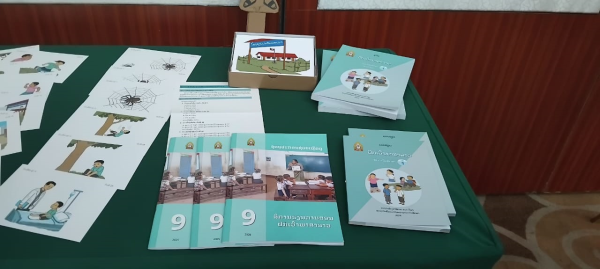ຂປລ
The Spoken Lao approach is an innovative initiative developed by the Ministry of Education and Sports (MoES) with support from Australia through the Basic Education Quality and Access in the Lao PDR (BEQUAL) programme.

Mr Outhit Thipmany, Deputy Director General of the Research Institute for Educational Sciences (L) and Ms Kate Goodfruit, Acting First Secretary, Australian Embassy, officially opened the Forum in Vientiane on July 16.
(KPL) The Spoken Lao approach is an innovative initiative developed by the Ministry of Education and Sports (MoES) with support from Australia through the Basic Education Quality and Access in the Lao PDR (BEQUAL) programme.
The objective of the Spoken Lao approach is to help Grade One students from non-Lao speaking communities develop oral Lao language skills.

A group photo of 130 participants from key MoES departments, Provincial and District Education offices, development partners and NGOs
Launched nationwide in September 2024, Spoken Lao lessons are now being implemented in classrooms across the country.
By focusing on speaking and listening skills through student-centered activities and games, the Spoken Lao lessons lay the foundation for students who do not speak Lao at home to access the national primary curriculum and improve learning outcomes across all subjects.

Students enjoying a Spoken Lao lesson in the classroom
With the first year of nationwide implementation coming to an end, key stakeholders identified the need to reflect on lessons learned and define next steps.
MoES, with support from the Australian Government, hosted a major Spoken Lao Stakeholder Forum on July 16.
Mr Outhit Thipmany, Deputy Director General of the Research Institute for Educational Sciences (RIES), and Ms Kate Goodfruit, Acting First Secretary, Australian Embassy, officially opened the Forum.
The event gathered around130 participants from key MoES departments, Provincial and District Education offices, and a wide range of development partners, including the World Bank, JICA, UNICEF, and several NGOs.

Teacher using a puppet during a speaking practice activity to encourage students to speak in Lao
Mr Outhit Thipmany said, “This Spoken Lao Stakeholder Forum marks a critical opportunity for stakeholders to share lessons learned and shape the future directions of the Spoken Lao approach, including expansion to additional grades. We are seeing real impacts from the Spoken Lao lessons. More children from ethnic communities are participating confidently in class and are better prepared for reading and writing in Lao. This forum allows us to build on this momentum.”

Representative from development partners, including the World Bank, JICA, UNICEF, and NGOs attend the event in Vientiane on July 16
Ms Kate Goodfruit added, “The Spoken Lao approach is a great example of how a successful pilot provided the evidence for the Lao government to confidently scale the approach to primary schools nationwide. The Spoken Lao approach is transforming the learning experience of thousands of children in urban, rural, remote and disadvantaged areas. Australia is proud to support the Ministry of Education with this initiative promoting inclusive education and better learning outcomes for children who have a home language other than Lao. This Forum is about celebrating progress and refining our vision for the future.”

Representative from MoES departments, Provincial and District Education offices
Technical experts and local implementers outlined the key elements of the Spoken Lao approach. All grade one teachers, primary principals and pedagogical support providers were trained to teach Spoken Lao lessons.
Specific teaching and learning materials provide for a minimum of three hours of supplementary Lao Language teaching per week.
Ms Kate Goodfruit shared, "In some schools teachers are even using the Spoken Lao teaching and learning materials as part of remedial language support for Lao speaking students because they feel it can help all learners to develop their communication skills in Lao. This highlights the benefits of having structured and fun remedial programmes in the early grades of primary school to support foundational learning."
The presenters also shared findings from the BEQUAL-led Inclusive Teaching and Learning Study, programme monitoring data and implementation strategies used during the 2024–2025 school year.

This informed priorities for future improvements and expansion of the Spoken Lao approach to additional grades.
A highlight of the Forum was the screening of Teacher Development Video 25, which was produced by RIES to support the teaching of Spoken Lao lessons. It showcases real classroom practices and strategies.
The video includes prompts to encourage teachers to reflect on their own practice and how they will change their teaching to ensure students understand and are learning.
“Teaching a new curriculum is always challenging for teachers. It is essential that we continue to provide clear and consistent guidance, supported by real classroom examples, like the ones in this video,” said Mr Outhit Thipmany. “It empowers our teachers and reinforces quality teaching practices.”
Ms Kate Goodfruit concluded, “Our shared goal is for every child, regardless of their language background, to have the chance to succeed. The energy and collaboration at this Forum demonstrate that we are on the right path.”
The Spoken Lao Stakeholder Forum underscores the commitment of the Ministry of Education and Sports to provide inclusive education and lays the groundwork for further expanding the Spoken Lao approach.
KPL